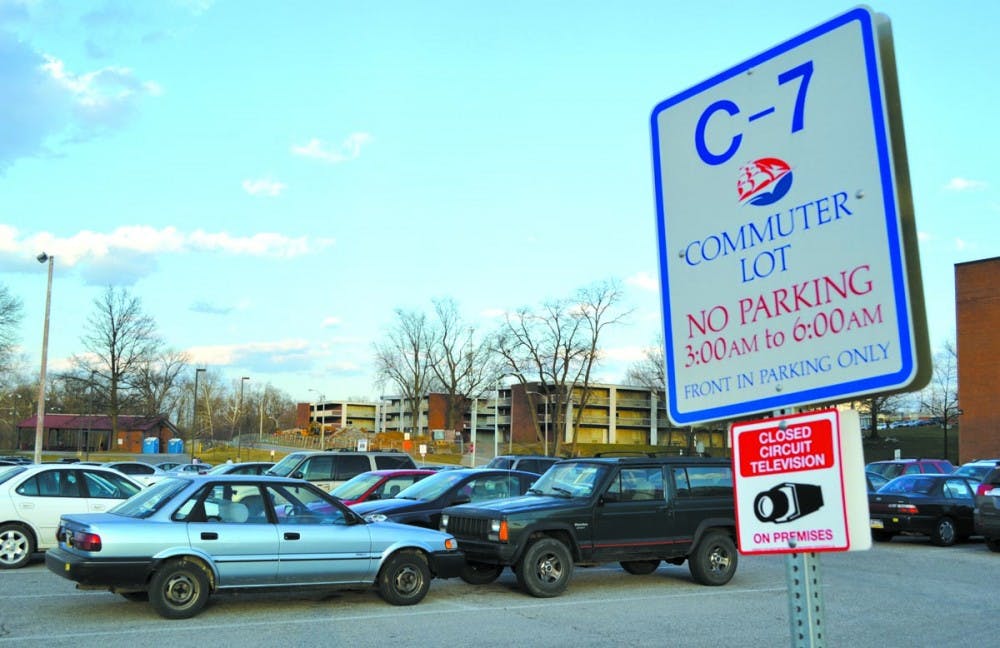Shippensburg University teaches more than 7, 100 students.
Of these students, more than 3,600 students requested commuter stickers between June 2010 and June 2011. (The number of decals includes repeats given to the same commuter due to loss, theft or a change in vehicle.)
But commuters may face differing struggles than those who live on campus. Parking tickets and the cost of decals are common fees for students. For students who have decided to commute, based on budgets, a homebody personality or being a mother of young children, they may pay as much as students who pay room and board each semester.
At the beginning of each school year, commuters and students with cars on campus must pay $65 to obtain a parking decal. The decal must be affixed to the right side of the vehicle’s bumper or attached onto the license plate. The decal, which changes color each year, is labeled with the identity of the student: resident or commuter.
If additional decals are purchased, for either a second vehicle on campus or theft or loss of the first decal, they must be purchased for $10. Faculty and staff are also required to have a parking decal, but receive it for $1 each school year.
The $65 fee goes to the Student Association budget, which is used for multiple clubs on campus. Each club must submit a budget request form, which is submitted to the Senate, and it is either approved or dismissed by Shippensburg University Budget and Finance Committee, said Kayla Nace, Chairperson of the Campus Safety Committee.
The budget for each club differs as each club intends to use the money in different ways.
After paying $65 for a parking decal, an added parking ticket expense may empty a pocket.
A general parking violation can cost up to $50, according to the Department of Public Safety’s website.From June 2010 to June 2011, 7,326 parking tickets were issues, said Police Chief Cythia Grissom. The number of tickets and the reason behind them varies each year, she said.
“Many of them are issued because vehicles failed to display any kind of parking decal or the vehicle was parked in an area which did not match the area designated on the parking decal,” Grissom said.
Megan Mowen, 22 of Clear Spring, Md., received one of the 7,000 tickets issued that year.
“I received a $10 ticket my second week at SU. I had parked in the back lot. Not knowing I was breaking a rule, I pulled through into a parking spot, so my car’s nose was facing directly into the aisle,” Mowen said.
Mowen said she pulled through in order to avoid backing out with low visibility. “I got back to my car and found a ticket on my window saying that I was being charged for ‘pulling through,’” she said. Patrick Cole, 20 of Waynesboro, Pa., said he received a $30 ticket after neglecting to buy a parking decal. He finally bought a decal after four weeks of classes beginning.
“I should have just bought the permit earlier,” Cole said. Molly Sanders experienced a grueling walk to campus after having surgery on both of her shins.
After going to the campus police station to get a temporary handicap-parking pass, with doctor’s note in hand, Sanders was denied on the reasoning that it didn’t specifically say she needed a handicap pass. Sanders disregarded the rule and parked in a handicap pass for less than 10 minutes to later find a $50 ticket on her car.
“The same week, my roommate, who had some knee issues (no surgery, mind you), limped into the police station with no doctor’s note or anything and asked for a handicap pass. They promptly gave her one,” Sanders said.
Keep your cash
Grissom advises students to park in areas designated for them, be it commuter or student lots. Most of the lots are monitored by cameras and patrolled and regulated by university police officers, she said.
Also, be aware of the rules. The reason for the no pull-through rule in all lots on campus is to allow easy visibility for university police. The parking lots are labeled and rules are explained in pamphlets given out when purchasing a parking decal.
Hanging passes are not given to students because it is difficult to control them. “They can be passed around from vehicle to vehicle. They are also much more easily misplaced or lost entirely,” Grissom said.



The Slate welcomes thoughtful discussion on all of our stories, but please keep comments civil and on-topic. Read our full guidelines here.